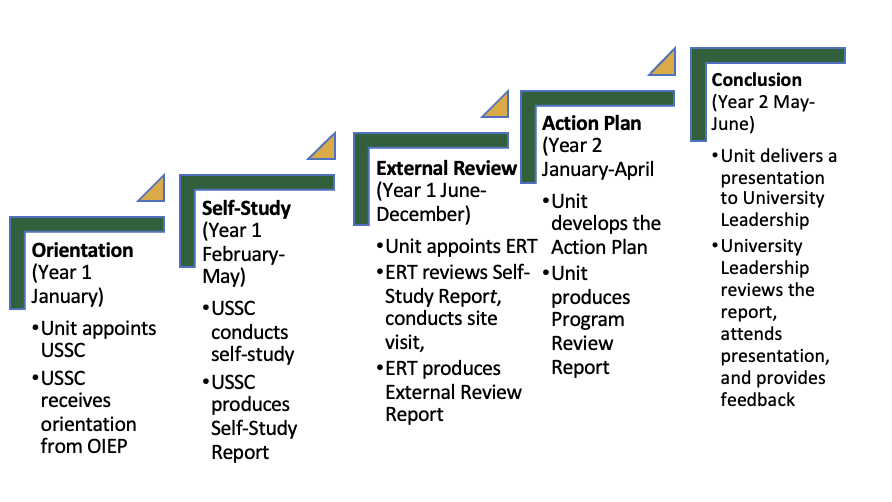Resources for Co-Curricular Units
Co-Curricular Program Review Guide
The Unit Self-Study Committee (USSC) appoints the External Review Team (ERT) who will review the unit’s Self-Study Report and conduct a site visit. The USSC lead is responsible for communicating with the external reviewers to confirm their participation in the process.
Nominations for at least three external reviewers will be made by the USSC (including names, CV, or web-link to a professional page, and contact information) and forwarded by the USSC lead to the Unit Lead and Associate Dean for approval. In selecting potential reviewers, the team should consider the following criteria:
| Timeline | Units |
|---|---|
| Spring 2021 – Spring 2022 | Student Involvement |
| Spring 2022 – Spring 2023 | Student Media |
| Spring 2023 – Spring 2024 | Disability Services
Learning Services Office of International Programs and Services Mason Recreation |
| Spring 2024 – Spring 2025 | Housing and Residence Life
Leadership Education and Development New Student and Family Programs Student Health Services |
| Spring 2025 – Spring 2026 | Contemporary Student Services
First Gen+ Center Student Success Coaching Student Support and Advocacy Center University Career Services |
| Spring 2026 – Spring 2027 | Academic Integrity
Center for the Advancement of Well-Being Center for Culture, Equity, and Empowerment |
| Spring 2027 – Spring 2028 | Counseling and Psychological Services
Green Machine Ensembles LGBTQ+ Resources Center |
| Spring 2028-Spring 2029 | UL Regional Campuses
Women and Gender Studies Center |
| Spring 2029-Spring 2030 | Early Identification Program
Graduate Student Life Student Conduct *Student Involvement *Student Media |
Co-Curricular Program Review, which mirrors Mason’s Academic Program Review (APR) process, is conducted every seven years. As a five-step process, CCPR typically takes three semesters (from the spring semester of Year 1 to the spring semester of Year 2).
The primary goal of the Co-Curricular Program Review (CCPR) process is to assess co-curricular programs and services, particularly as related to student outcomes and success. As a reflective and evidence-based process, CCPR includes the collection of critical and relevant quantitative and qualitative information that informs and instructs programs and services in their work and mission.
CCPR is supported and guided by assessment experts in the Office of Institutional Effectiveness and Planning (OIEP), and the process consists of five phases. An overview of what units can expect over the course of the three semesters is presented in the figure below.
